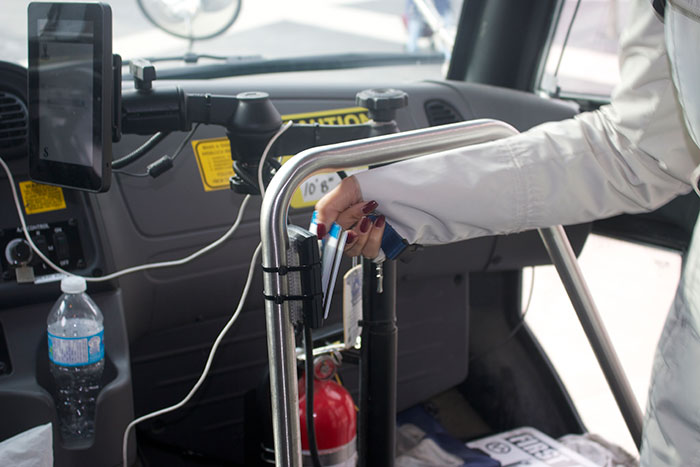First step taken in ending bus pass vs shuttle debate
STORY BY ERIN QUEENAN AND MIKE MELRO
Sheridan College and the Student Union are conducting an email survey about student transit, a topic that’s been on the discussion table for eight years.
Launched last week, the survey aims to better understand student transit preferences and consider “solutions to the shuttle bus capacity challenges,” according to an email sent out by the college.
“We have been hearing from students about a U-Pass for a while now,” said Sheridan Student Union president Sylvia Ibrahim.
“There have been many complaints about the [shuttle] service and we are always assessing the needs of the students. With this survey we have provided a few options for them to choose from and hopefully it helps.”
The survey, about 15 minutes in length, asks students to describe their commute to campus in detail: what modes of transportation are used, how many times, which days of the week and time of day. It then asks students to assess the quality of the shuttle bus service and the town bus, if they use it.
Finally, the last couple of questions in the survey ask students how the college can improve services and offers three options: enhance the existing shuttle bus, negotiate a universal transit pass (U-Pass) and cancel the shuttle bus, or keep the current shuttle bus system.
The second option, the U-Pass, was offered to Sheridan students by the Town of Oakville back in 2007. The pass is a student transit card that allows unlimited free rides on public transit. A holder simply shows their pass to the bus driver when boarding. Each semester, students pay a fee to the program.
Schools that have the service include the University of Toronto Mississauga, Wilfrid Laurier University, Western University, McMaster University, Fanshawe College, Carleton University, the University of Ottawa, Langara College, Douglas College and the University of British Columbia.
“That is wonderful news,” Mayor Rob Burton said on the telephone when he heard the college and union were doing a survey to put a U-Pass back on the discussion table.
“Part of our vision of being the most livable town in Canada is having good transit,” said Burton.
The U-Pass was considered as an option for students in 2007 and 2009. Oakville Transit approached the SSU to propose the college hold a referendum asking if students wanted the pass. Both times the union refused, saying students wouldn’t be interested.
In 2010, the Student Union surveyed students about the U-Pass and found:
• 58 per cent who lived in Oakville and attended Trafalgar said they would use the pass.
• 68 per cent who lived in Mississauga and attended Trafalgar said they would use the pass.
• 70 per cent who lived in Brampton and attended Davis said they would use the U-Pass.
• 80 per cent of those surveyed living in Mississauga and attending Davis said theywould use the pass.
But students also indicated it’s a pass good for all campuses. So the next year, two months after Sheridan opened its new Hazel McCallion Campus, Oakville, Mississauga and Brampton councils proposed one pass for all students, unlimited use, good for all campuses.
They proposed a $185 fee per student for the entire school year. A single ride on the bus in Oakville is $3.50. However the Student Union rejected the idea saying it was too expensive.
MORE RELATED TO THIS STORY
- Student Union should stop saying “screw you” to u-pass
- Survey shows students wouldn’t pass up a u-pass
- Student Union and college scramble to fix shuttle bus mess
Other universities that have the U-pass pay about the same, at Western University it is $182, at the University of Toronto Mississauga it is $187 and McMaster University students pay $182. Sheridan’s pass is unique in that it allows students to use the buses of three municipalities instead of one and at $185 costs less than two months of transit passes.
In addition, transit ridership by students increases 50 per cent in the first year after adopting the U-Pass, says director of Oakville Transit Barry Cole. When UTM approved the pass in a student referendum in 2007, it was so popular that more buses had to be added. For Oakville it would be Routes 1, 5 and 24, part of the cost of the pass covers beefing up those services.
A U-Pass would render the shuttle bus service irrelevant. The college started the shuttle, splitting the cost of around $600,000 per year with the Student Union. It has since risen to around $700,000 per year, with the SSU taking on the extra cost for the overflow buses.
After a three-year pause, the Sheridan Sun conducted a survey last fall, and out of 477 students 90 per cent said they were in favour of the U-pass.
“We took notice of that. We are ready to work with you again. We are always ready to serve you,” said Burton.
Ibrahim, the SSU president, noted that since starting her job about six months ago she has heard many complaints about the shuttle service. With such a broad range of issues regarding transit, she hopes the survey will assess the specific needs of the students.
Cole said it is not unusual for a pass to take four to six years to be put into place. The Student Union leadership changes every year so the town always has to re-establish a relationship.
As parking pass prices increase and ideal parking spots become harder to find, a pass is also an option for students with cars, Cole said.
His daughter went to Brock University and she got a U-Pass with the school. She told her dad that although she had a car and there were often times that she would use her U-pass to go to school because she would be staying late or going to the pub that night. “There’s a lot of advantages to the U-Pass, that’s why so many schools have adopted them,” Cole said.
The data collected from the survey will be handed over to the Institutional Research Centre of the school, which is independent of the Student Union. The results will be presented to the college in December. If it shows that students want the pass, Ibrahim will put a U-pass up to a referendum in early to mid 2016.
If the majority of students vote for the U-pass an agreement with the city will be negotiated in mid 2016. Once a price is negotiated, this price will go to students again in a referendum. If approved the new system will be implemented in September 2017.
Charlit Floriano, 22, Computer Animation student, thinks it would be great to have the option of a U-pass. She currently walks about fifteen minutes to school and has to rely on Sheridan’s grocery bus to shop. “The bus will drop me off at the college and then I’ll have to walk home with my groceries.” With a U-pass she can take a bus home from school and to shop.
For Alix St. Pierre, getting a U-pass makes a lot of sense. The 24-year-old marketing management student shares a car with her brother. He drives her to school in the morning and she goes home and picks him up later in the evening. Because they have different class schedules sometimes instead of going home and back to pick him up she will leave the car and bus home. For her a five minute bus ride at 3.50 isn’t worth it.
“Might as well cab at that price.”
If she took the bus one way home every day it would cost her $105 a month, if she took the bus both ways it would cost $210 a month. “I also wouldn’t have to pitch in gas or insurance or oil changes or parking. I would [use a U-pass] for sure.”






One Response to First step taken in ending bus pass vs shuttle debate